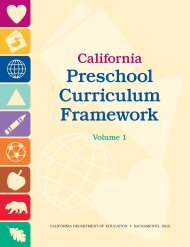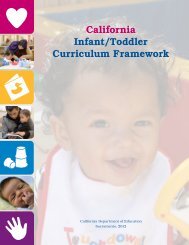California Preschool Learning Foundations - ECEZero2Three ...
California Preschool Learning Foundations - ECEZero2Three ...
California Preschool Learning Foundations - ECEZero2Three ...
You also want an ePaper? Increase the reach of your titles
YUMPU automatically turns print PDFs into web optimized ePapers that Google loves.
awareness of and response to diversity<br />
in gender, culture, and ethnicity,<br />
particularly as these are apparent in<br />
differences in people’s appearance and<br />
behavior. This is complex research<br />
literature, particularly because of the<br />
multiple origins (e.g., social learning,<br />
conceptual development, direct exposure<br />
to diversity) of young children’s<br />
responses to human diversity in their<br />
experience; see Aboud (2005, 2003).<br />
Empathy and Caring<br />
Young children’s capacities to<br />
respond sympathetically and helpfully<br />
to others in distress have been<br />
of long-standing interest to parents,<br />
professionals, and researchers. These<br />
capacities build on children’s developing<br />
social and emotional understanding<br />
and contribute to their ability to<br />
cooperate successfully with others in<br />
group learning environments.<br />
In understanding the development<br />
of caring, it is important to distinguish<br />
a young child’s emotional response to<br />
another’s distress, which emerges very<br />
early, from the behavioral capacity<br />
to help the distressed person. Knowing<br />
how to aid a peer in distress is a<br />
complex challenge to a young child<br />
(it is an even greater conceptual challenge<br />
to figure out how to assist a<br />
distressed adult); therefore, genuine<br />
helping behavior emerges later in the<br />
preschool years than does a child’s<br />
emotional response to another’s upset.<br />
The period of three to four years of age<br />
is a crucial one. From before the age<br />
of three, young children respond with<br />
concerned attention to the distress of<br />
another and are interested in finding<br />
out why the person is upset. But it is<br />
not until later in the preschool years<br />
that children can accompany their<br />
empathic response with assistance<br />
<strong>California</strong> Department of Education • <strong>Preschool</strong> <strong>Learning</strong> <strong>Foundations</strong>, Volume 1<br />
25<br />
(although this does not necessarily<br />
occur reliably). For recent reviews of<br />
this research, consult Eisenberg, Spinrad,<br />
and Sadovsky (2006), Thompson<br />
(1998), and Zahn-Waxler and Robinson<br />
(1995).<br />
Initiative in <strong>Learning</strong><br />
How children approach new learning<br />
and problem-solving challenges<br />
is a critical feature of their academic<br />
success. “Approaches to learning” is<br />
an important predictor of classroom<br />
achievement in kindergarten and<br />
the primary grades, with the term<br />
“approaches to learning” defined as<br />
teacher ratings of children’s classroom<br />
engagement, motivation, and participation<br />
(Alexander, Entwisle, and Dauber<br />
1993; Duncan, Claessens, and Engel<br />
2005). Young children’s natural curiosity,<br />
interest, and self-confidence that<br />
they can discover the answers to their<br />
questions are a central component of<br />
their capacities to benefit from learning<br />
opportunities (Thompson 2002).<br />
Beginning in early childhood, there<br />
are significant differences in the<br />
enthusiasm, motivation, and selfconfidence<br />
that children bring to new<br />
learning situations. The work of Dweck<br />
and her colleagues has demonstrated<br />
that from relatively early in childhood,<br />
children develop distinctly different<br />
learning styles that influence their initiative<br />
in learning and their persistence<br />
when faced with difficult challenges<br />
(see Burhans and Dweck 1995; Dweck<br />
2002; Dweck and Leggett 1988). Children<br />
with a “performance orientation”<br />
focus on efforts in learning situations<br />
that elicit positive evaluations from<br />
others and avoid negative judgments.<br />
As a consequence, these children<br />
may avoid situations that are likely to<br />
result in failure and they may not per-<br />
SOCIAL-EMOTIONAL DEVELOPMENT
















